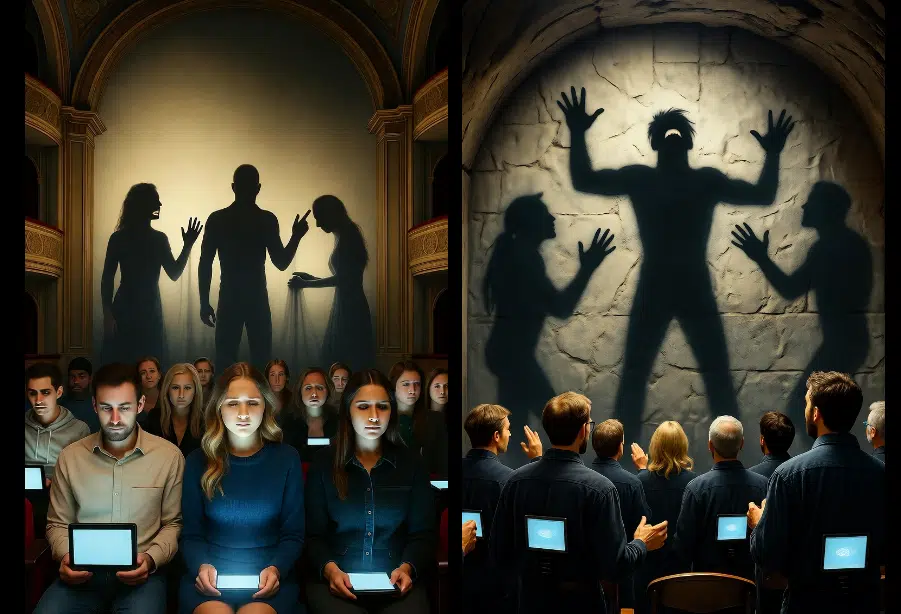
REVIEW: All Hail The New God, The Almighty Universe (Even Thor Must Bow)
“The universe has judged you. You asked it for a prize and it told you no.” –Gamora, “Avengers: Infinity War”
“Thor: Love and Thunder” surpassed its predecessor standalone film “Thor: Ragnarok” this week in terms of box office receipts.
The reviews, however, have been somewhat mixed among devotees of Marvel movies. So here’s a little advice for Marvel Studios and Disney if they wish to continue telling stories of divine proportions:
Consider how big God really is before writing about divinity.
Last month’s unveiling of the James Webb Telescope’s deep field image put everything into perspective size-wise. The universe is mind-bogglingly ginormous — 93 billion light years in diameter, by our best guesses. Even with less than 13 hours’ worth of exposure, the groundbreaking image taught us, among many other things: Cosmic voids aren’t often as empty as we thought, organic compounds are found throughout the observable universe (not just in our own galaxy’s neighborhood), and our immediate view is chock-full of galaxies — each one containing billions of stars like our own sun.
Add this to what we already “knew:” that it would take NASA’s still-chugging-along Voyager probe 1.7 billion (with a “b”) years to cross even our own galaxy. A light-speed spacecraft could take 100,000 years unless that velocity were somehow increased. To get to earth’s nearest star would take 4 years going at light speed and 73,000 years at the speed of Voyager. And what Voyager will one day encounter may be more wild than anything we can imagine here on earth — not simply more darkness (while there’s plenty of that in between).
Point being: even with fantastic fictional powers to crisscross the heavens like the Bifrost, and futuristic technologies enabling light-speed travel, the universe remains an amorphous, ever-growing, unfathomable frontier. And that’s not counting the “multiverse” concept of alternate realities embraced by Marvel titles of late.
Now if you intreat the gods present in “Thor: Love and Thunder,” the universe and its resident guardians may as well be Mayberry from “The Andy Griffith Show.” Even less believable: the universe itself is — whether innocently or intentionally on the part of the scriptwriters — a sort of overarching deity who controls the affairs of gods, of men, and of numerous other lifeforms.
This capital-“U” Universe even plays matchmaker.
(For sake of argument, and not to confuse it with the mind-bogglingly large universe mentioned above, we’ll call this entity the YOU-niverse and the physical realm the lower-case “u” universe. Got it? Good.)
“Love and Thunder” starts out with a crisis of faith: a parched and starved devotee who loses his daughter to the cruel elements, only to find later that his indulgent god does not care. He tells the grieved father there is no “heavenly reward” for his piety, at which point a mysterious imbuement from beyond turns the angry father into a god-butcherer named Gorr (played masterfully by Christian Bale).
The scene changes to Thor (Chris Hemsworth), who after shedding the pounds from previous entries, is having a bit of an existential crisis following the retirement and fracturing of his mystical-powered hammer. He’s busy recreating the glory days of his “classic Thor adventures,” regardless of the consequences of his public image. Hammer or not, he’s still got it, albeit he’s reckless.
Enter Thor’s former love interest and dying cancer patient Dr. Jane Foster (Natalie Portman) who becomes a seemingly more worthy Thor after having been chosen by Thor’s reassembled hammer. Her newfound powers and ongoing cancer prognosis are in a precarious balance.
Here’s where the dichotomy between gods and the God worshipped by Hollywood elites makes an appearance. As Thor, new Thor, and company tour the galaxy in search of allies to stop Gorr, they encounter numerous luminaries of myth and legend, such as a showboating Zeus (Russell Crowe) and, oddly, a Chinese food dumpling as part of the Zeus-loving pantheon. Nowhere is the Judeo-Christian God mentioned, nor Allah, nor any Hindu deities. Yet one overarching figure commonly revered in the non-cinematic real world is calling the shots in terms of rekindling Mr. and Ms. Thor’s relationship. Who might that be?
You guessed it: The YOU-niverse. In “Love and Thunder,” it’s the YOU-niverse putting Jane back in Thor’s path. It’s the YOU-niverse guiding Team Thor through several adventures. It’s the YOU-niverse giving meaning to it all. It even appears to be sitting in a lotus position.

The universe can often be ignored in a script as a euphemism for God. It’s much more politically correct and pluralistic to say “the universe’s” timing is always right, works in mysterious ways, etc. Reason being: contemporary liberalism has at its goal to topple dominant paradigms, and that includes not giving the central figure of the predominant faith of Western Civilization too much of the spotlight.
Far from the concept of Providence embraced by our Founding Fathers, the YOU-niverse does not offend progressive sensibilities. From “mindfulness exercises” in public school classrooms, to an oft-used Dr. Martin Luther King‘s quote about a “moral universe” bending toward justice, it’s not objectionable to worship this deity, even on the public dime. Few would call that religion at all.
What YOU-niverse worship actually represents is a kowtow to a growing challenge of Eastern philosophy to the Judeo-Christian paradigm. And with all due respect to those who worship according to those faith traditions, the YOU-niverse is run through an American filter of selfishness. This hard-to-define universal god looks an awful lot like you and me. A god in our own image, but without a holy and distinct personality.
That’s nothing new in America, and made popular by growing anti-American sentiment and a counter-embrace of anything different. This alternative religiosity is essentially a self-oriented, Americanized Zen Buddhism that appropriates the concept of the divine existing in all matter and inside each one of us. It assumes the entirety of everything in earth and in space must’ve been rooting for you when you found a $20 bill on the ground. It’s the kind of spirituality you hear about on an Oprah Winfrey TV special or in during a goat yoga event in a city park. Or maybe it’s the Force from “Star Wars.”
Make no mistake: this YOU-niverse is decidedly anti-Western in flavor. When Thor and company (quickly, by the way, as if skipping across the sidewalks in Mayberry) reach the apex of their odyssey, the center of the Milky Way galaxy, they encounter an entity known as the Eternity (see photo above). As you can almost guess, the Eternity a star-filled silhouette of a guy taking a common meditative position in Buddhism. It teaches everyone about love in a lesson more suited for a Beatles song than Norse mythology. This hug-it-out lesson solves much of the complex plot, avoiding any real spoilers. La la la.
According to theologian and Christian publisher Kenneth Boa, this Eastern mysticism archetype reflects a growing sentiment of not just Buddhism but Pantheism among Americans — particularly the elite and among the artistic class such as the Hollywood elite. Boa wrote in 2009:
In the United States it is clear that pantheistic thought is rising. … whereas only about 5 percent of Americans did not believe in God or did not know what they believed, some 12 percent of Americans professed to believe in a divine spirit or force rather than in a personal God. Most or all of these Americans evidently hold to a pantheistic worldview rather than a theistic one. Even larger numbers of Americans accept elements of pantheistic religious or philosophical thought. For example, for some time now roughly one in four Americans has believed in reincarnation, and the number may soon be closer to one in three. It is therefore likely that far more than 12 percent of Americans have a worldview that is more pantheistic than theistic.
The number of Americans who do not believe in a deity at all may now be as high as 19 percent according to a recent Gallup poll — a new low.
This may explain why your average religious American may hold to a belief in kharma (a Hindu principle of how earthly actions affect your future condition) and Jesus’s death on the cross as payment for sin simultaneously. It’s a buffet of religious choices that many enjoy — about as wild as Zeus’s chamber in “Love and Thunder.”
All this to say that in Hollywood’s efforts to whitewash our heroes of most any reference to our Judeo-Christian heritage (Captain America’s vague monotheism as one noteworthy exception — though perhaps a throwback) we should not kid ourselves that religion in general has been displaced. Rather, it’s the same tired pattern of one paradigm toppling the other. Thus, even the Mighty Thor worships a God: and it’s the same YOU-niverse worshipped by the Hollywood elite.
Christian ministry Focus on the Family, pointing out another Marvel movie nod to the YOU-niverse in “Avengers: Infinity War,” termed this as “Hollywood’s stand-in for God.” Wrote Subby Szterszky:
Replacing God with the universe has become a standard trope in popular culture, showing up in movies, TV shows, interviews and social media posts. Almost any type of story or personal anecdote that requires mention of a higher power will routinely invoke the universe as that power. This occurs so often that it almost escapes notice, largely because it’s a belief shared by many in the wider culture. Even professing Christians will at times speak of the universe rewarding or punishing them, or else teaching them a lesson.
It’s a sobering thought, therefore, to realize that God – the real God, who created the heavens and the earth and everything in them – takes a rather dark view of such a belief. Contrary to pantheism, God is indeed a personal being, distinct from His creation, far above and beyond it while still present everywhere in it. The universe is His universe, and He rules it with perfect wisdom and absolute power. To replace God with His creation is to give it the honour and worship that belongs solely to Him. The Scriptures refer to this practice as the sin of idolatry.
Leave it to us — the lone world superpower ever so proud of splitting the atom and putting man on the moon — to speak of the universe with such familiarity and hubris. It’s a high view on us, and a low view on God and the breadth of the universe. Maybe we all need to get out more.
Like “Love and Thunder,” the YOU-niverse is fantasy. But expect to hear more from its acolytes in the future, even as images from the Webb telescope teach those paying attention how small we truly are, and how immense and holy our Creator must truly be.



